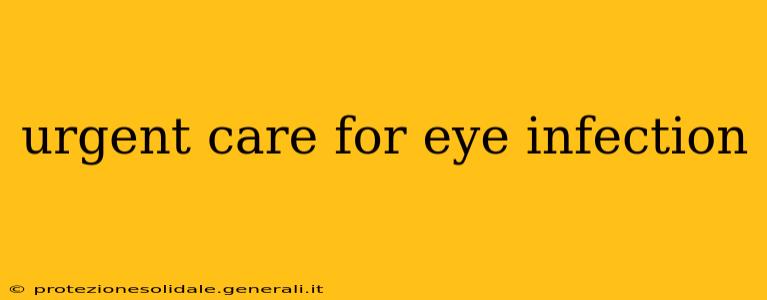Eye infections, while often treatable at home with over-the-counter remedies for minor issues, can sometimes require urgent medical attention. Knowing when to seek urgent care for an eye infection is crucial to prevent complications and preserve your vision. This guide will help you understand the signs and symptoms that warrant immediate medical attention and what to expect when you visit an urgent care facility.
What are the symptoms of an eye infection requiring urgent care?
Many eye infections present with symptoms like redness, itching, and mild discharge. However, some symptoms indicate a more serious infection requiring immediate medical attention. These include:
- Severe pain: Intense pain in your eye is a red flag. This could signify a more serious infection like corneal ulceration or uveitis.
- Sudden vision changes: Blurred vision, loss of vision, or seeing halos around lights requires immediate medical attention. These could be signs of serious conditions like glaucoma or retinal detachment.
- Significant swelling: Excessive swelling around the eye, especially if accompanied by pain or fever, needs urgent evaluation.
- Pus or thick discharge: While some discharge is common, excessive amounts of thick, yellow or green pus can indicate a bacterial infection requiring antibiotics.
- Photophobia (sensitivity to light): Intolerance to light, often accompanied by squinting and discomfort, is another warning sign.
- Fever and chills: These symptoms, combined with eye pain or other eye infection symptoms, suggest a systemic infection requiring immediate medical care.
How is an eye infection diagnosed in urgent care?
Urgent care providers will perform a thorough eye examination to diagnose the cause of your eye infection. This may include:
- Visual acuity test: Checking your vision to determine the extent of any vision impairment.
- Slit-lamp examination: A magnified view of your eye structures to identify the specific infection or condition.
- Examination of the surrounding tissues: Checking for swelling, redness, and other signs of infection in the surrounding area.
- Collection of samples: In some cases, a sample of the discharge may be taken and sent to a laboratory for analysis to determine the type of infection.
What treatments are available for eye infections at urgent care?
Treatment options for eye infections in urgent care vary depending on the diagnosis. Common treatments include:
- Antibiotic eye drops or ointment: For bacterial infections.
- Antiviral eye drops or ointment: For viral infections.
- Steroid eye drops: To reduce inflammation.
- Pain relievers: To manage pain and discomfort.
- Referral to an ophthalmologist: If the infection is severe or requires specialized treatment.
What if my eye infection doesn't improve after urgent care?
If your symptoms don't improve after treatment from urgent care, or if they worsen, it's crucial to follow up with your doctor or an ophthalmologist. Some infections may require more extensive treatment or a different approach. Don't hesitate to seek further medical advice if needed.
Can I treat a mild eye infection at home?
For mild eye infections with minimal symptoms like mild redness and itching, some home remedies may offer temporary relief. These include applying a warm compress to soothe the eye and practicing good hygiene, such as washing your hands frequently and avoiding touching your eyes. However, it's important to remember that home remedies are not a substitute for professional medical advice, especially if symptoms worsen or don't improve.
When should I see an ophthalmologist instead of urgent care?
While urgent care can handle many eye infections, certain situations warrant an immediate visit to an ophthalmologist (eye doctor):
- Suspected retinal detachment: This requires immediate specialized care.
- Suspected glaucoma: This condition needs prompt diagnosis and treatment.
- Severe corneal ulceration: This requires specialized care to prevent vision loss.
- Conditions requiring surgery: Some eye infections may necessitate surgery.
Remember, this information is for general knowledge and does not constitute medical advice. Always seek professional medical attention for any concerns about your eye health. Prompt diagnosis and treatment are crucial to prevent serious complications and protect your vision.
